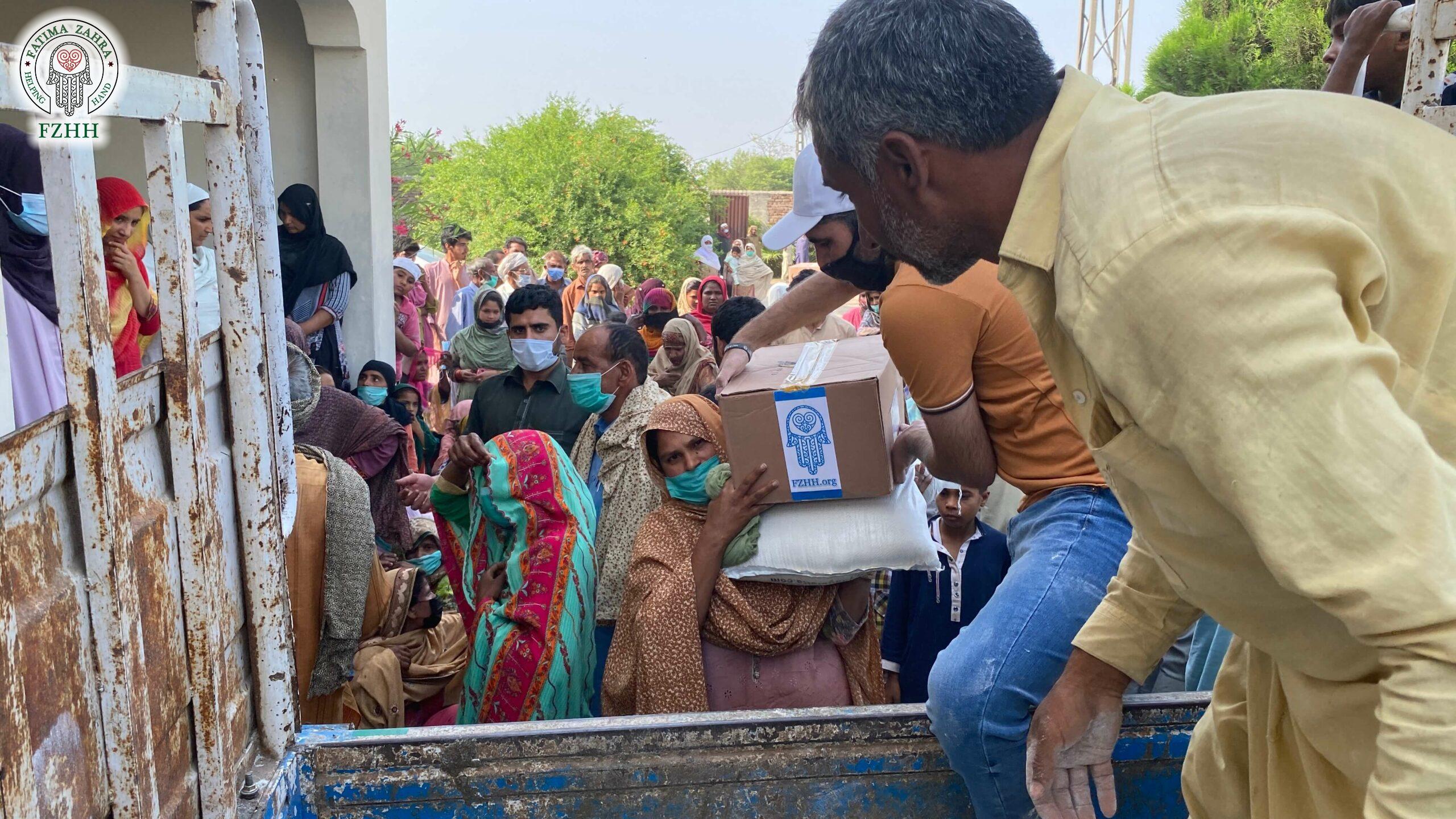
¡Dios Te Da Permiso Para Orar!
De las Realidades de Mawlana Shaykh (ق) impartido por el Shaykh Nurjan Mirahmadi
A’udhu Billahi Minash Shaitanir Rajeem
Bismillahir Rahmanir Raheem
Busco refugio en Allah de Satanás el desterrado
En el Nombre de Allah, el más Misericordioso, el más Compasivo
Alhamdulillahi Rabbil ‘aalameen, was salaatu was salaamu ‘alaa Ashraful Mursaleen, Sayyidina wa Mawlana Muhammadul Mustafa ﷺ. Madad ya Sayyidi ya Rasulul Kareem, Ya Habibul ‘Azeem, unzur halana wa ishfa’lana, ‘abidona bi madadikum wa nazarekum.
Hay Un Conocedor Por Encima De Cada Conocedor
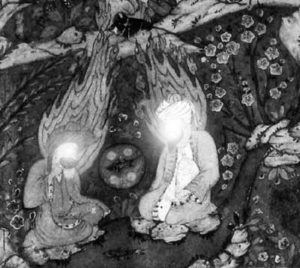 Siempre como un recordatorio para mi que al enseñar estas verdades es posible que muchas personas no tengan la paciencia para comprenderlas. Y el instinto natural es estar en contra. Y lo que Allah (AJ) dio de adab (modales) en el Sagrado Corán, cuando Sayyidina Khidr (as) estaba tratando con Nabi Musa (as). Y la altura y la posición de Nabi Musa (as), significa cualquier darajah (rango espiritual) que alguien sea. Los siervos de Allah (AJ) son muchos y por encima del darajah de todos puede haber alguien que sepa más y puede que no tenga ningún título oficial. Entonces, lo que Allah (AJ) estaba mostrando en el Sagrado Corán en Surat (Capitulo) al-Kahf, es que esta persona a quien usted puede ver como nadie, puede tener un conocimiento de Sayyidina Musa (as).
Siempre como un recordatorio para mi que al enseñar estas verdades es posible que muchas personas no tengan la paciencia para comprenderlas. Y el instinto natural es estar en contra. Y lo que Allah (AJ) dio de adab (modales) en el Sagrado Corán, cuando Sayyidina Khidr (as) estaba tratando con Nabi Musa (as). Y la altura y la posición de Nabi Musa (as), significa cualquier darajah (rango espiritual) que alguien sea. Los siervos de Allah (AJ) son muchos y por encima del darajah de todos puede haber alguien que sepa más y puede que no tenga ningún título oficial. Entonces, lo que Allah (AJ) estaba mostrando en el Sagrado Corán en Surat (Capitulo) al-Kahf, es que esta persona a quien usted puede ver como nadie, puede tener un conocimiento de Sayyidina Musa (as).
﴾نَرْفَعُ دَرَجَاتٍ مَّن نَّشَاءُ ۗ وَفَوْقَ كُلِّ ذِي عِلْمٍ عَلِيمٌ ﴿٧٦
12:76 – “…Narfa’u darajatin man nashao, Wa fawqa kulli dhee ‘ilmin ‘aleem.” (Surat Yusuf)
“… Elevamos en grados a quienes queremos, y por encima de cada conocedor hay un conocedor más grande”. (José, 12:76)
Sayyidina Khidr (as) es el 10mo (décimo) Shaykh de Naqshbandi Tariqah
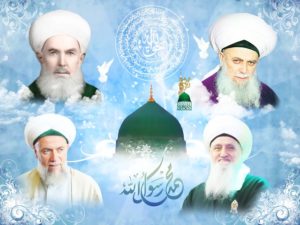 Y este es un Naqshandi shaykh – Sayyidna Khidr (as) en nuestra shajarah, en el silsila (linaje espiritual) de Naqshbandiya y el décimo shaykh. Entonces significa que la herencia todavía corre en la tariqah (camino espiritual). La tariqah debe tener siempre 7007 de 124.000 awliya (santos) en la tierra, 7007 son Naqshbandi. Y están bajo la tarbiyah de Mawlana Shah Naqshband (Q). Y que cada uno se viste con 12.000 realidades distintas. Y en dunya (mundo material) tal vez una de esas realidades pueda mostrarse a partir de esos uloom (casas) y conocimientos. Entonces Naqshbandiya tiene una enorme riqueza.
Y este es un Naqshandi shaykh – Sayyidna Khidr (as) en nuestra shajarah, en el silsila (linaje espiritual) de Naqshbandiya y el décimo shaykh. Entonces significa que la herencia todavía corre en la tariqah (camino espiritual). La tariqah debe tener siempre 7007 de 124.000 awliya (santos) en la tierra, 7007 son Naqshbandi. Y están bajo la tarbiyah de Mawlana Shah Naqshband (Q). Y que cada uno se viste con 12.000 realidades distintas. Y en dunya (mundo material) tal vez una de esas realidades pueda mostrarse a partir de esos uloom (casas) y conocimientos. Entonces Naqshbandiya tiene una enorme riqueza.
El Verdadero Conocimiento Destruye la Falsedad
Esos conocimientos no están destinados a atraer a la gente, porque quien escucha escucha, no escucha, no escucha. Pero pensado como alimento para el alma. Un haqqaiq (realidades) es como dar alimento al cuerpo que cuando lo tienes – la verdad te hará libre. Cuando surge un conocimiento, golpea, cuando es una verdad y cuando se llena de luz golpea el alma y disipa y aniquila toda falsedad. Porque Allah (AJ) dice que “la falsedad siempre perece”.
﴾وَ قُلْ جَآءَالْحَقُّ وَزَهَقَ الْبَطِلُ، إِنَّ الْبَطِلَ كَانَ زَهُوقًا ﴿٨١
17:81 – “Wa qul jaa alhaqqu wa zahaqal baatil, innal batila kana zahoqa.” (Surat Al-Isra)
“Y di: La verdad ha llegado y la falsedad pereció. De hecho, la falsedad, [por su naturaleza], está siempre pereciendo / destinada a perecer “. (El viaje nocturno, 17:81)
 Así que imagina que la gente está llena de falsedades, para la visualización, una verdad como una luz viene como un cañón ‘Hooo’ golpea el pecho y rompe la falsedad y comienza ahora a penetrar en el corazón. Y esa es la realidad de que Allah (AJ) … estuvimos hablando hoy temprano, ‘Soy solo uno’. Vieron un video que dice que los guías, guían desde el alma. Y dicen: ‘Es ajeeb (extraño) que nunca escucháramos cosas como esta. ¿De qué hablas de la guía desde el alma? ¿Y dónde está en el Corán y los hadices? ”Y todas sus enseñanzas son el Corán y los hadices del Profeta. Pero no estás leyendo el Corán de la misma manera.
Así que imagina que la gente está llena de falsedades, para la visualización, una verdad como una luz viene como un cañón ‘Hooo’ golpea el pecho y rompe la falsedad y comienza ahora a penetrar en el corazón. Y esa es la realidad de que Allah (AJ) … estuvimos hablando hoy temprano, ‘Soy solo uno’. Vieron un video que dice que los guías, guían desde el alma. Y dicen: ‘Es ajeeb (extraño) que nunca escucháramos cosas como esta. ¿De qué hablas de la guía desde el alma? ¿Y dónde está en el Corán y los hadices? ”Y todas sus enseñanzas son el Corán y los hadices del Profeta. Pero no estás leyendo el Corán de la misma manera.
La Guia es Solo de Allah (AJ)
Entonces, cuando Allah (AJ) dice que ‘La guía es solo de Allah (AJ)’, lo que decimos para el Jum’ah, “Alhamdulillah, Alhamdulillah, Alhamdulillahil Ladhi hadana li hadha wa maa kuna le nahtade lawla an hadanAllah”, que ‘alhamdulilah que llegamos a estas inmensas bendiciones y esa guía es solo de Allah (AJ) y no hay guía excepto de Allah (AJ). “
﴾وَقَالُوا الْحَمْدُ لِلَّـهِ الَّذِي هَدَانَا لِهَـٰذَا وَمَا كُنَّا لِنَهْتَدِيَ لَوْلَا أَنْ هَدَانَا اللَّـهُ ۖ لَقَدْ جَاءَتْ رُسُلُ رَبِّنَا بِالْحَقِّ…﴿٤٣…
7:43 – “…wa qalo Alhamdulillahi al ladhee hadana lihadha wa ma kunna linahtadiya lawla an hadana Allahu, laqad jaa at Rusulu Rabbina bil Haqqi…” (Surat Al-A’raf)
“… Alabado sea Allah, que nos ha guiado a esto [alegría y felicidad]; y nunca hubiéramos sido guiados si Allah no nos hubiera guiado… ”(Las Alturas, 7:43)
 Y en todo el Corán, cuando Allah (AJ) está describiendo, “Guía, guía, guía,” esto es el Corán, ¿qué está guiando Allah (AJ)? ¿Qué es la guía de Allah (AJ)? Cuando Allah (AJ) dice: “No buscamos el dunya por el peso de un ala de mosquito”, prepararemos su caso legal. Así que a Allah (AJ) no le importa nada de la creación como el ala de un mosquito, quizás enfatizando que incluso el ala de un mosquito es mucho más intensa de crear. Y que Allah (AJ) no mira a la sura a la forma de insan (humanidad). Así que el hadiz de Nabi ﷺ también siempre describe cómo Allah (AJ) no mira a la cara, no mira a tu forma.
Y en todo el Corán, cuando Allah (AJ) está describiendo, “Guía, guía, guía,” esto es el Corán, ¿qué está guiando Allah (AJ)? ¿Qué es la guía de Allah (AJ)? Cuando Allah (AJ) dice: “No buscamos el dunya por el peso de un ala de mosquito”, prepararemos su caso legal. Así que a Allah (AJ) no le importa nada de la creación como el ala de un mosquito, quizás enfatizando que incluso el ala de un mosquito es mucho más intensa de crear. Y que Allah (AJ) no mira a la sura a la forma de insan (humanidad). Así que el hadiz de Nabi ﷺ también siempre describe cómo Allah (AJ) no mira a la cara, no mira a tu forma.
عَنْ أَبِي هُرَيْرَةَ عَبْدِ الرَّحْمَنِ بْن صَخْرٍ قَالَ: قَالَ رَسُولُ اللهِ:” إِنَّ اللهَ لَا يَنْظُرُ إِلَى أَجْسَامِكُمْ، وَلَا إِلَى صُورِكُمْ، وَلَكِنَّ يَنْظُرُ إِلَى قُلُوبِكُمْ”. رَوَاهُ مُسْلِمٌ
‘An Abi Hurairah ‘Abdir Rahman bin Sakhar (ra) qala: qala Rasulullahi (saws):
“Inna Allaha la yanzuru ila ajsamikum, wa la ila suwarikum, wa laaken yanzuru ila Quloobukum.” [Rawahu Muslim]
Abu Hurairah (ra) narró que: El Mensajero de Allah (saws) dijo: “Allah no mira tu cuerpo / figuras, ni tu apariencia / figura, sino que mira sus corazones.” [Muslim]
Guia es Para el Alma, No Para el Cuerpo
 De esto es lo que Allah (AJ) se preocupa por lo que es eterno y Allah (AJ) no se preocupa por lo que fallece – ¡el tomate podrido no es donde pones tu atención! Lo que es eterno es la luz, lo que es eterno es el alma. Entonces, la guía de Allah (AJ) es para el alma. Cuando Allah (AJ) dice: “No hay guía excepto a través de Allah (AJ)”, (Corán, 7:43) Él está diciendo: “¡Porque este es Mi dominio!” Puedes llamar a todos los burros que quieras; porque lo físico es como un burro, algunos adiestrados, más tercos. Puedes llamar a todos los burros que quieras, ponerlos en fila, sentarte, gritarles todo lo que crees que sabes sobre el Islam o lo que sea, no van a escuchar.
De esto es lo que Allah (AJ) se preocupa por lo que es eterno y Allah (AJ) no se preocupa por lo que fallece – ¡el tomate podrido no es donde pones tu atención! Lo que es eterno es la luz, lo que es eterno es el alma. Entonces, la guía de Allah (AJ) es para el alma. Cuando Allah (AJ) dice: “No hay guía excepto a través de Allah (AJ)”, (Corán, 7:43) Él está diciendo: “¡Porque este es Mi dominio!” Puedes llamar a todos los burros que quieras; porque lo físico es como un burro, algunos adiestrados, más tercos. Puedes llamar a todos los burros que quieras, ponerlos en fila, sentarte, gritarles todo lo que crees que sabes sobre el Islam o lo que sea, no van a escuchar.
﴾اَلْحَمْدُ لِلّهِ الَّذِي هَدَانَا لِهَـٰذَا وَمَا كُنَّا لِنَهْتَدِيَ لَوْلَا أَنْ هَدَانَا اللَّـهُ ۖ“﴿٤٣
7:43 – “…Alhamdulillahi al ladhee hadana lihadha wa ma kunna linahtadiya lawla an hadana Allahu …”(Surat Al-A’raf)
“… Alabado sea Allah, que nos ha guiado a esto [alegría y felicidad]; y nunca hubiéramos sido guiados si Allah no nos hubiera guiado … ” (Las Alturas, 7:43)
No Es a Quien Quieres Guiar, Sino a Quien Guia Allah (AJ)
Y la guía no está en tus manos. Debido a que la enseñanza viene de Allah (AJ), ‘¡No es a quién guías sino a quién guiamos!’ Y esto siempre fue enseñado por Allah (AJ) a todos los profetas (as), es la sunnah de los profetas (as), ‘No es a quién quieres que entre en esta religión, sino a quién quiere Allah (AJ). ‘¿Por qué? Debido al estrés y la enseñanza, “¡La guía proviene del alma!” Malakut (el reino celestial) es kulli shay (todo), todo el poder está en malakut y la luz.
﴾فَسُبْحَانَ الَّذِي بِيَدِهِ مَلَكُوتُ كُلِّ شَيْءٍ وَإِلَيْهِ تُرْجَعُونَ ﴿٨٣
36:83 – “Fasubhanal ladhee biyadihi Malakotu kulli shay in wa ilayhi turja’oon.” (Surat YaSeen)
“Por tanto, la gloria sea a Aquel en cuya mano está el dominio / reino sobre todo lo que hay en los cielos, y a Él serás devuelto”. (YaSeen, 36:83)
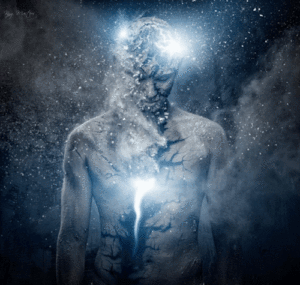 Si Allah (AJ) no le da isharat (señal) a la luz de esa persona. Esto es que un mandato de Allah (AJ) vendrá, tu alma será guiada. Y fue escrito en el día de las promesas, su darajah (estado) exacto fue escrito. No puedes subir más, pero puedes ser empujado y tratar de bajar, pero Allah (AJ) te limpiará, te limpiará, te dará dificultades hasta que lo alcances a través de las dificultades. Puedes ir beatíficamente a tu estado haciendo tu ‘ibadah (adoración) y tu trabajo o la realidad de las dificultades es que eres golpeado por este mundo de una manera tan intensa que lograrás ese maqam (estado). Pero de cualquier manera logras el maqam.
Si Allah (AJ) no le da isharat (señal) a la luz de esa persona. Esto es que un mandato de Allah (AJ) vendrá, tu alma será guiada. Y fue escrito en el día de las promesas, su darajah (estado) exacto fue escrito. No puedes subir más, pero puedes ser empujado y tratar de bajar, pero Allah (AJ) te limpiará, te limpiará, te dará dificultades hasta que lo alcances a través de las dificultades. Puedes ir beatíficamente a tu estado haciendo tu ‘ibadah (adoración) y tu trabajo o la realidad de las dificultades es que eres golpeado por este mundo de una manera tan intensa que lograrás ese maqam (estado). Pero de cualquier manera logras el maqam.
La Guia Es Una Energia Que Llega Al Alma
 Pero no es el aspecto físico en el que arrastra a alguien, los obligas a sentarse en su asociación, les das $5 y luego ahora dices estoy guiando a la gente. Allah (AJ) tiene que guiar el alma; isharat llega al alma, el alma recibe una energía y el poder de Allah (AJ) reside dentro del corazón. Significa que isharat llega al alma y la señal comienza a entrar en el corazón de ese sirviente. Como resultado, ese siervo ahora viene hacia donde Allah (AJ) quiere que vengan. Eso se llama magnetismo. Describimos en otra charla que Allah (AJ) tiene que enviar una señal al corazón y esa señal se inclinará magnéticamente hacia donde Allah (AJ) quiera que sea. Cuando Allah (AJ) hace que ese corazón sea guiado, se inclina hacia Sayyidina Muhammad ﷺ. Y como resultado se encuentra a si mismo acercándose al Islam.
Pero no es el aspecto físico en el que arrastra a alguien, los obligas a sentarse en su asociación, les das $5 y luego ahora dices estoy guiando a la gente. Allah (AJ) tiene que guiar el alma; isharat llega al alma, el alma recibe una energía y el poder de Allah (AJ) reside dentro del corazón. Significa que isharat llega al alma y la señal comienza a entrar en el corazón de ese sirviente. Como resultado, ese siervo ahora viene hacia donde Allah (AJ) quiere que vengan. Eso se llama magnetismo. Describimos en otra charla que Allah (AJ) tiene que enviar una señal al corazón y esa señal se inclinará magnéticamente hacia donde Allah (AJ) quiera que sea. Cuando Allah (AJ) hace que ese corazón sea guiado, se inclina hacia Sayyidina Muhammad ﷺ. Y como resultado se encuentra a si mismo acercándose al Islam.
Queremos La Mirada Sagrada Del Profeta ﷺ y Awliyaullah
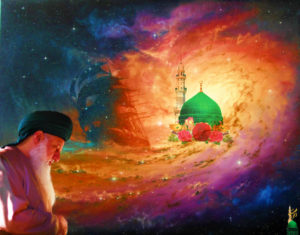 Entonces, por supuesto, la guía se realiza a través del alma. No se trata de rodear los cuerpos y luego hablarles de una manera que los apaciguará. Pero Allah (AJ) les enseñó temprano en sus vidas, esto es del mundo de la luz. Cuando estos shaykhs hayan sido entrenados a través de tarbiyah, a través de energías, a través de realidades. Ellos no solo hicieron salah (oración), sino que Allah (AJ) les enseñó la realidad de su salah con su alma con su energía con todo este faiz (bendiciones torrenciales) que se dirigen a ellos.
Entonces, por supuesto, la guía se realiza a través del alma. No se trata de rodear los cuerpos y luego hablarles de una manera que los apaciguará. Pero Allah (AJ) les enseñó temprano en sus vidas, esto es del mundo de la luz. Cuando estos shaykhs hayan sido entrenados a través de tarbiyah, a través de energías, a través de realidades. Ellos no solo hicieron salah (oración), sino que Allah (AJ) les enseñó la realidad de su salah con su alma con su energía con todo este faiz (bendiciones torrenciales) que se dirigen a ellos.
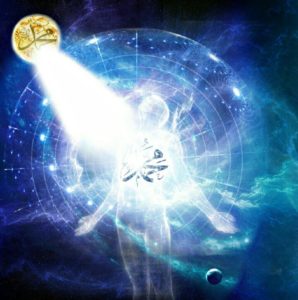 Que cuando operan desde su alma, cada palabra bajo su permiso es un faiz y una luz que se acerca. ¿Por qué queremos el faiz de los sheijs bajo su nazar (mirada)? Es por eso que queremos la faiz de Sayyidina Muhammad ﷺ sobre todo. No le pedimos al Profeta ﷺ que nos escuche, pero “unzur halana” es eso, “Pon tu bendito nazar sobre mí. Que la luz venga de tu alma a mi alma y traiga este amor e ishq (amor) como un imán y me atraiga a tu presencia “.
Que cuando operan desde su alma, cada palabra bajo su permiso es un faiz y una luz que se acerca. ¿Por qué queremos el faiz de los sheijs bajo su nazar (mirada)? Es por eso que queremos la faiz de Sayyidina Muhammad ﷺ sobre todo. No le pedimos al Profeta ﷺ que nos escuche, pero “unzur halana” es eso, “Pon tu bendito nazar sobre mí. Que la luz venga de tu alma a mi alma y traiga este amor e ishq (amor) como un imán y me atraiga a tu presencia “.
﴾يَا أَيُّهَا الَّذِينَ آمَنُوا لَا تَقُولُوا رَاعِنَا وَقُولُوا انظُرْنَا وَاسْمَعُوا …﴿١٠٤
2:104 – “Yaa ayyuhal ladheena aamano, laa taqolo ra’yina wa qolu unzurna wasma’o…” (Surat Al-Baqarah)
“¡Oh, creyentes! No digas (al Profeta Muhammad (la paz sea con él)) ra’yena, escúchanos y di Unzurna (míranos) y escuchas (a él (la paz sea con él) … “(La Vaca, 2:104)
No Te Vanaglories Tu Mismo Por Tus Buenas Acciones
En Tazkiratul Awliya (Biografías de los santos), Sayyidina Abu Yazid al-Bistami (Q) estaba asombrado por su amor por Allah (AJ), ‘¡Te amaba, te amaba, te amaba!’ Hasta un día en el que llegó, Y descubrí que Tu amor es más antiguo que el mío. Me han llamado aquí ‘. No se dio crédito a sí mismo de que logró algo, de que se acercó, de que oró y de que adoró. Tu no le des crédito al burro y al cuerpo. Por eso cuando hablan por malakut. No es una arrogancia que estén hablando de cosas tan grandes. No, no, actualmente es una realidad. Y es una humilde realidad. Que no oró, que no oró porque fue inteligente para orar. Porque si Allah (AJ) no te guía, no harás tu sujood (postración) mañana.
Allah (AJ) Nos da Permiso y Poder Para Orar – “Hawla wa Quwwah”
Y es por eso que cuando escuchas el azaan (llamado a la oración), dices “La hawla wa la quwwata illa billahil ‘Aliyyul’ Azim”, ¿entiendes?
وَلاَ حَوْلَ وَلاَ قُوَّةَ اِلاَّ بِاللهِ الْعَلِيِّ الْعَظِيْمِ
“Wa laa hawla wa la quwwata illa billahil ‘Aliyyil ‘Azheem.”
“Y no hay apoyo / fuerza, ni poder excepto por Allah, el Sublime Exaltado, el Magnífico.”
 Cuando el azan se apaga, “No puedo orar ni tener éxito sin Tu Hawla (apoyo) y Tu Quwwah (poder)”. Así que le digo a mi alma que no puedo llegar a ningún éxito. El éxito de Allah (AJ) es el paraíso. Hawla y quwwah – y, ‘No puedo llegar a ningún poder, no tengo autoridad sobre mí mismo Ya Rabbi, a menos que liberes a los demonios que me retienen y me llames a mi salah’. Y es por eso que cuando el azaan se apaga, nosotros decimos “La hawla wa la quwwata illa billahil ‘Aliyyul’ Azim”. “No tengo ninguna acción en mí mismo, no reclamo nada de mí mismo, Ya Rabbi, concédeme la madad, concédeme ese apoyo, concédeme un poder y podré venir a mi salah”.
Cuando el azan se apaga, “No puedo orar ni tener éxito sin Tu Hawla (apoyo) y Tu Quwwah (poder)”. Así que le digo a mi alma que no puedo llegar a ningún éxito. El éxito de Allah (AJ) es el paraíso. Hawla y quwwah – y, ‘No puedo llegar a ningún poder, no tengo autoridad sobre mí mismo Ya Rabbi, a menos que liberes a los demonios que me retienen y me llames a mi salah’. Y es por eso que cuando el azaan se apaga, nosotros decimos “La hawla wa la quwwata illa billahil ‘Aliyyul’ Azim”. “No tengo ninguna acción en mí mismo, no reclamo nada de mí mismo, Ya Rabbi, concédeme la madad, concédeme ese apoyo, concédeme un poder y podré venir a mi salah”.
Las Verdaderas Guias Te Llevan De Regreso a la Realidad de Tu Paraiso
Entonces todo es del mundo de malakut (reino celestial). Aquellos que están guiados de regreso, no guíados del mundo, están guiando a las personas que lo llevan de regreso al paraíso, de regreso a sus realidades paradisíacas; ellos vienen de eso. Cuando hablan, hablan con energía y con autoridad. Y esa energía entra como verdad a toda falsedad, rompe su falsedad y como flechas empiezan a entrar en ese insan. Y dicen, escuchan, escuchan y sienten que las cosas se abren y las tinieblas se disipan.
Allah (AJ) Permitio a Los Humanos Crear Tecnologia Para Entenderse Asi Mismo
 Y cuando hablamos hoy antes, uno de los hermanos decía: “Es mucho en las computadoras”. Después del zikr (canto), hablaremos sobre computadoras y por qué tienes que hacer tu awrad diario. Y el entendimiento de las computadoras; ¿Crees que el hardware, el hardware es importante o el software? Entonces, cuando decimos que la guía viene del alma, en la tecnología, Allah (AJ) nos dio tecnología para conocernos a nosotros mismos. Cuando la humanidad hizo una computadora, estaban tratando de crear un insan; ponen cabeza ponen tripas ponen todo. Estaban tratando de replicar lo que hace Allah (AJ). Por eso hacen tecnología, porque quieren hacer algo. Quieren tener crédito por algo. Allah (AJ) les permite, ‘¡Haz la computadora! Porque si lo estudias deberías encontrar más sobre ti “.
Y cuando hablamos hoy antes, uno de los hermanos decía: “Es mucho en las computadoras”. Después del zikr (canto), hablaremos sobre computadoras y por qué tienes que hacer tu awrad diario. Y el entendimiento de las computadoras; ¿Crees que el hardware, el hardware es importante o el software? Entonces, cuando decimos que la guía viene del alma, en la tecnología, Allah (AJ) nos dio tecnología para conocernos a nosotros mismos. Cuando la humanidad hizo una computadora, estaban tratando de crear un insan; ponen cabeza ponen tripas ponen todo. Estaban tratando de replicar lo que hace Allah (AJ). Por eso hacen tecnología, porque quieren hacer algo. Quieren tener crédito por algo. Allah (AJ) les permite, ‘¡Haz la computadora! Porque si lo estudias deberías encontrar más sobre ti “.
Sin Software, Incluso El Telefono Mas Caro Es Inutil
 Entonces, el hardware (aparato/objeto) que tienes, aunque es bueno y elegante, realmente no hace ninguna diferencia a menos que el software (programación) esté en él. Cuando Allah (AJ) envía el software, este teléfono tiene guía y funciona. Puedes tener el mejor teléfono del mundo, pero no obtuviste una actualización o descarga de software, nada tiene valor para ti. ¿Por qué? “Malakut kulli shay“
Entonces, el hardware (aparato/objeto) que tienes, aunque es bueno y elegante, realmente no hace ninguna diferencia a menos que el software (programación) esté en él. Cuando Allah (AJ) envía el software, este teléfono tiene guía y funciona. Puedes tener el mejor teléfono del mundo, pero no obtuviste una actualización o descarga de software, nada tiene valor para ti. ¿Por qué? “Malakut kulli shay“
﴾فَسُبْحَانَ الَّذِي بِيَدِهِ مَلَكُوتُ كُلِّ شَيْءٍ … ﴿٨٣
36:83 – “Fasubhanal ladhee biyadihi Malakotu kulli shay…” (Surat YaSeen)
“Por tanto, Gloria a Aquel en cuya mano está el dominio / reino sobre todo en los cielos,…” (YaSeen, 36:83)
Sin El Permiso de Allah (AJ), No Podemos Orar Ni Ayunar
Allah (AJ) quiere que entendamos, ‘No puedes ayunar sin Mi permiso, no puedes orar sin Mi permiso, no puedes ser generoso sin Mi permiso, no puedes hacer nada’. Y es por eso que en Jum’ah estamos diciendo que vinimos a esta inmensa bendición que Allah (AJ) nos otorgó, una inmensa bendición de que podemos hacer nuestra sujood (postración) inshaAllah. Hacemos nuestras oraciones, hacemos nuestro zikr, hacemos nuestro ayuno, hacemos toda esta adoración es un regalo de Allah (AJ).
﴾اَلْحَمْدُ لِلّهِ الَّذِي هَدَانَا لِهَـٰذَا وَمَا كُنَّا لِنَهْتَدِيَ لَوْلَا أَنْ هَدَانَا اللَّـهُ ۖ“﴿ ٤٣
7:43 – “…Alhamdulillahi al ladhee hadana lihadha wa ma kunna linahtadiya lawla an hadana Allahu …”(Surat Al-A’raf)
“… Alabado sea Allah, que nos ha guiado a esto [alegría y felicidad]; y nunca hubiéramos sido guiados si Allah no nos hubiera guiado … ”(Las Alturas, 7:43)
Solo a Los Que Allah (AJ) Permite Escucharan; No Puedes Obligar a Nadie
 Porque cuando haces dawah (propagación religiosa) entiendes cuando alguien decide que se va a alejar del Islam, como si Allah (AJ) les hubiera cortado ese faiz. Y no quieren rezar, no quieren ayunar y no quieren hacer nada. Y no puedes sacudirlos para que lo hagan, no puedes gritarles que lo hagan. Porque Allah (AJ) recuerda que “hadanAllah” (Corán, 7:43): “Soy Yo quien determina quién va a orar”. Soy Yo quien determina quién va a mencionar Mi nombre en su casa.”
Porque cuando haces dawah (propagación religiosa) entiendes cuando alguien decide que se va a alejar del Islam, como si Allah (AJ) les hubiera cortado ese faiz. Y no quieren rezar, no quieren ayunar y no quieren hacer nada. Y no puedes sacudirlos para que lo hagan, no puedes gritarles que lo hagan. Porque Allah (AJ) recuerda que “hadanAllah” (Corán, 7:43): “Soy Yo quien determina quién va a orar”. Soy Yo quien determina quién va a mencionar Mi nombre en su casa.”
Agradezca a Allah (AJ) que Nos Permite Hacer El Bien
En el surat (capítulo) an-Nur Allah (AJ) dijo: “Ellos tienen mi permiso para mencionar Mi nombre”.
﴾فِي بُيُوتٍ أَذِنَ اللَّـهُ أَن تُرْفَعَ وَيُذْكَرَ فِيهَا اسْمُهُ يُسَبِّحُ لَهُ فِيهَا بِالْغُدُوِّ وَالْآصَالِ ﴿٣٦
24:36 – “Fee buyotin adhina Allahu an turfa’a wa yudhkara feeha ismuhu yusabbihu lahu feeha bilghuduwwi wal asal.” (Surat An-Nur)
“(Lit. es tal Luz) en las casas, que Allah ha permitido que sean elevadas a la honra; y que su nombre sea mencionado en él: En ellos es glorificado por las mañanas y por las tardes (una y otra vez) “. (La Luz, 24:36)
 Cuando alguien dice que no quiere hacer zikr. ¡Incorrecto! Allah (AJ) no quiere que menciones Su nombre. Y tú deberías estar muy asustado y triste por eso. No le pongas nada a tu propia inteligencia, eso es egoísmo. Pero si hablas desde una luz y hablas desde una realidad, ellos dicen: “Oh, está siendo arrogante mostrándose”. Oh, no estoy hablando; Soy un burro para esta gente. Pero el ‘Azimah (Might) de Allah (AJ), si lo escuchas, es humillante. Es humillante que, ‘No tenemos poder, no tenemos autoridad, no tenemos la capacidad de hacer nada, si Allah (AJ) no envía la orden’. Y es por eso que zikrullah (recuerdo de Allah), es por eso que el tafakkur y la contemplación, por eso todas estas prácticas son para decir “Alhamdulillah wa shukranlillah, Alhamdulillah wa shukranlillah“. Para que Allah (AJ) nos vista, nos bendiga y nos dé un buen día otro ‘amal (acción). “Ya Mi Señor, no nos abandones, no nos dejes, no te enojes con nosotros, no, no nos impidas orar por nuestro zikr, por todas nuestras buenas obras”.
Cuando alguien dice que no quiere hacer zikr. ¡Incorrecto! Allah (AJ) no quiere que menciones Su nombre. Y tú deberías estar muy asustado y triste por eso. No le pongas nada a tu propia inteligencia, eso es egoísmo. Pero si hablas desde una luz y hablas desde una realidad, ellos dicen: “Oh, está siendo arrogante mostrándose”. Oh, no estoy hablando; Soy un burro para esta gente. Pero el ‘Azimah (Might) de Allah (AJ), si lo escuchas, es humillante. Es humillante que, ‘No tenemos poder, no tenemos autoridad, no tenemos la capacidad de hacer nada, si Allah (AJ) no envía la orden’. Y es por eso que zikrullah (recuerdo de Allah), es por eso que el tafakkur y la contemplación, por eso todas estas prácticas son para decir “Alhamdulillah wa shukranlillah, Alhamdulillah wa shukranlillah“. Para que Allah (AJ) nos vista, nos bendiga y nos dé un buen día otro ‘amal (acción). “Ya Mi Señor, no nos abandones, no nos dejes, no te enojes con nosotros, no, no nos impidas orar por nuestro zikr, por todas nuestras buenas obras”.
No Confie En Sus Hechos, Confie En El Amor de Sayyidina Muhammad ﷺ
La mejor acción, la mejor acción para llamar la atención de Allah (AJ) es el amor de Sayyidina Muhammad. Porque inevitablemente estarás enojando a Allah (AJ). Y es por eso que Mawlana (Q) estaba enseñando que el Profeta dijo: “No atravieses la puerta del juicio con Allah (AJ)”.
عَنْ اَلسَّيِّدَة عَائِشَةَ رَضِيَ اللَّهُ عَنْهَا، عَنِ النَّبِيِّ صَلَّى اللَّهُ عَلَيْهِ وَسَلَّمَ ، قَالَ :” لَيْسَ أَحَدٌ يُحَاسَبُ إِلَّا هَلَكَ قُلْتُ.” – صحيح مسلم ٥٢٥٤
‘An As sayyidah ‘Ayesha (ra), ‘anin Nabi (saws), Qala: “laysa ahadun yuhasabu illa halaka qultu.”
Narrado por Sayida Ayesha (ra), el Profeta (Muhammad) que la paz y las bendiciones sean con él dijo: “Cualquiera que pida su hisab (contabilidad), está condenado”. [Sahih Muslim 5254]
 Si dices: “Confío solo en Allah (AJ)”, probablemente puedas contar 1000 veces desde el momento en que te despertaste hasta la noche, probablemente hayas hecho algo con lo que Allah (AJ) se va a enfadar. Entonces, si solo confías en ti mismo con Allah (AJ), awliya ven y enseña: ‘Es muy peligroso’. Entonces, si quieres la satisfacción de Allah (AJ) y quieres que Allah (AJ) siga enviando hawla y quwwa para que podemos hacer todo nuestro hermoso ‘amal, amar a Sayyidina Muhammad más de lo que nos amamos a nosotros mismos.
Si dices: “Confío solo en Allah (AJ)”, probablemente puedas contar 1000 veces desde el momento en que te despertaste hasta la noche, probablemente hayas hecho algo con lo que Allah (AJ) se va a enfadar. Entonces, si solo confías en ti mismo con Allah (AJ), awliya ven y enseña: ‘Es muy peligroso’. Entonces, si quieres la satisfacción de Allah (AJ) y quieres que Allah (AJ) siga enviando hawla y quwwa para que podemos hacer todo nuestro hermoso ‘amal, amar a Sayyidina Muhammad más de lo que nos amamos a nosotros mismos.
Nuestro Amor Recibe La Atencion Del Profeta ﷺ e Intercede Por Nosotros
 Porque en todo momento “…hareesun ‘alaykum, bil mumineena raufun Raheem“, Su nazar “shahidan, mubashshiran, wa nazheeran“, está observando su ummah (nación).
Porque en todo momento “…hareesun ‘alaykum, bil mumineena raufun Raheem“, Su nazar “shahidan, mubashshiran, wa nazheeran“, está observando su ummah (nación).
﴾لَقَدْ جَاءَكُمْ رَسُولٌ مِّنْ أَنفُسِكُمْ عَزِيزٌ عَلَيْهِ مَا عَنِتُّمْ حَرِيصٌ عَلَيْكُم بِالْمُؤْمِنِينَ رَءُوفٌ رَّحِيمٌ ﴿١٢٨
9:128 – “Laqad jaa akum rasulum min anfusikum ‘azizun ‘alayhi maa ‘anittum harisun ‘alaykum bilmuminina raufun rahim.” (Surat At-Tawbah)
“Ciertamente ha llegado a ustedes un Mensajero de entre / Dentro de ustedes; le entristece que perezcas; [él está] preocupado por ti, y con los creyentes es muy bondadoso y misericordioso “. (El Arrepentimiento, 9:128)
y
﴾يَا أَيُّهَا النَّبِيُّ إِنَّا أَرْسَلْنَاكَ شَاهِدًا وَمُبَشِّرًا وَنَذِيرًا ﴿٤٥
33:45 – “Ya ayyuhan Nabiyu inna arsalnaka shahidan wa mubashshiran wa nadheera.”(45) (Surat Al-Ahzab)
“Oh Profeta, de hecho te hemos enviado como testigo y portador de buenas nuevas y como advertencia. (45) (Las fuerzas combinadas, 33:45)
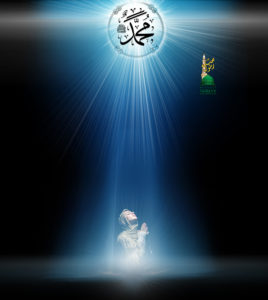 Porque lo amas, porque te concentras en él, él se concentra en ti. Él está viendo: “Te vas a quedar corto, antes de que esto llegue a Allah (AJ), voy a interceder por este amado siervo, este amado siervo de Allah (AJ)”, y muhib y amante de Sayyidina Muhammad. Él va a interceder por nuestras acciones y esa es la importancia. Este amor que tenemos, mantiene el nazar del Profeta sobre nosotros; intercediendo continuamente donde vamos equivocadamente, donde nos estamos quedando cortos, cualquiera como una familia.
Porque lo amas, porque te concentras en él, él se concentra en ti. Él está viendo: “Te vas a quedar corto, antes de que esto llegue a Allah (AJ), voy a interceder por este amado siervo, este amado siervo de Allah (AJ)”, y muhib y amante de Sayyidina Muhammad. Él va a interceder por nuestras acciones y esa es la importancia. Este amor que tenemos, mantiene el nazar del Profeta sobre nosotros; intercediendo continuamente donde vamos equivocadamente, donde nos estamos quedando cortos, cualquiera como una familia.
Como un Padre Amoroso, El Profeta ﷺ Previene a Su Nacion del Fuego
 Cuando tienes a tus hijos, a quienes amas donde quiera que se queden cortos en su vida, todo tu ser está para ayudarlos. Si están enfermos y les falta un órgano, les darías tu órgano para mejorarlos. ¿No crees que el profeta tiene este amor por nosotros? ¿Qué mostraste este amor por esa realidad y nos quedamos cortos y él permitirá que eso entre en la presencia de Allah (AJ) para traer la ira de Allah (AJ)? ¿O va a interceder?
Cuando tienes a tus hijos, a quienes amas donde quiera que se queden cortos en su vida, todo tu ser está para ayudarlos. Si están enfermos y les falta un órgano, les darías tu órgano para mejorarlos. ¿No crees que el profeta tiene este amor por nosotros? ¿Qué mostraste este amor por esa realidad y nos quedamos cortos y él permitirá que eso entre en la presencia de Allah (AJ) para traer la ira de Allah (AJ)? ¿O va a interceder?
¿Y qué decimos en Jum’ah (oración del viernes)? Ese “…daril jaheem, Mafkharil‘ Arabi wal ‘Ajami…” El que impide que su nación entre en la morada del fuego. Conoces a estas mismas personas, no sé si escuchan estas palabras en Jum’ah. Que cuando estamos haciendo nuestro Jum’ah decimos “querido Jaheem“, el que mantiene a su nación alejada de la morada del fuego.
اللّهُمَّ صَلِّ وَسَلِّمْ عَلَى سَيِّدِنَا مُحَمَّدٍ أنَّهِيْ ٱُمَّتَهُ عَنْ دَارِالْجَهِيمْ. مَفْخَرِالْعَرَبِيْ وَالْعَجَمْ، مَوْلَانَا وَ مَوْلَا الْعَالَمَيْنِ مُحْتَرَمَيْنِ، سَيِّدِنَا اَبِي الْقَاسِمْ مُحَمَّدْ
Allahumma salli wa sallim ‘alaa sayyidina Muhammadin, an nahyi ummatahu ‘an daril jaheem. Mafkharil ‘Arabi wal ‘Ajam, Mawlana wa mawlal ‘alamaynil muhtaramayni, Sayyidina Abil Qasime Muhammad.
 Oh Allah, envía bendiciones sobre nuestro maestro Sayyidina Muhammad y sobre la Familia de nuestro maestro Sayyidina Muhammad (la paz sea con él). Oh Allah, envía paz y bendiciones a nuestro maestro Sayyidina Muhammad, quien impide que su nación entre en la morada del fuego. Él es el orgullo de todos los árabes y no árabes, nuestro maestro y el maestro de los dos mundos respetados, nuestro líder Abul Qasim Sayyidina Muhammad (la paz sea con él).
Oh Allah, envía bendiciones sobre nuestro maestro Sayyidina Muhammad y sobre la Familia de nuestro maestro Sayyidina Muhammad (la paz sea con él). Oh Allah, envía paz y bendiciones a nuestro maestro Sayyidina Muhammad, quien impide que su nación entre en la morada del fuego. Él es el orgullo de todos los árabes y no árabes, nuestro maestro y el maestro de los dos mundos respetados, nuestro líder Abul Qasim Sayyidina Muhammad (la paz sea con él).
Oramos para que Allah (AJ) nos arrope, nos bendiga, nos dé más paciencia y más entendimiento. InshaAllah volveremos, tenemos el Naqshbandi Khatm y hablaremos sobre la realidad del Wi-Fi y las awrads diarias (prácticas diarias). InshaAllah.
Ila sharifin Nabi ﷺ wa ila aalihi wa sahbihil kiram, Wa ila arwahi mashayikhina fit tariqatin Naqshbandiyatil ‘aaliyah, wa ila sayiri sadatina wa Siddiqin. Al Fatiha.
Un agradecimiento especial a nuestros traductores al español por su ayuda con la transcripción de esta suhbah.
Fecha original de Suhbah: 13 de agosto de 2020
Artículos relacionados
- Reality of light, and Intercession of the Flag of Praise
- Run to Prophet ﷺ & Ask Allah’s Forgiveness “Jaooka fastaghfirollaha” Tafsir Qur’an 4:64
- God’s Light (Nur) Like Laser Burning Away Sinful Rust in Iron of the Heart
- Guaranteed Way To Erase Very Big Sins
- Souls of Lovers of Prophet (saws) in Heart of Prophet (saws)
Por favor considere hacer una donación y apoyarnos en la propagación de estos conocimientos celestiales.
Copyright © 2021 Centro Islámico Naqshbandi de Vancouver. Todos los derechos reservados.













![Private: [ID: kf_z5GeFzZY] Youtube Automatic](https://nurmuhammad.com/wp-content/uploads/private-id-kfz5gefzzy-youtube-au-236x133.jpg)
